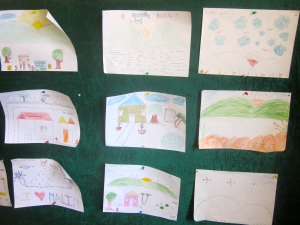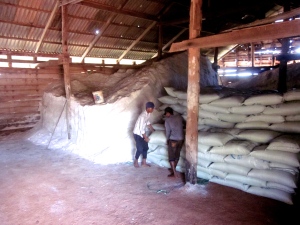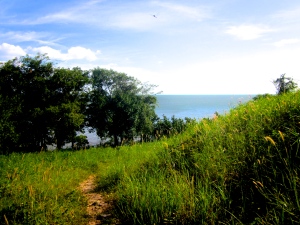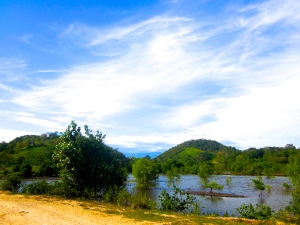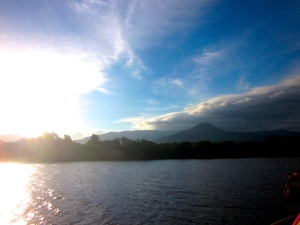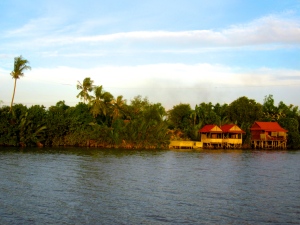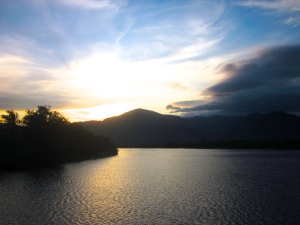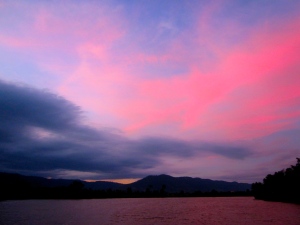The harvesting seasons is coming to an end. The beautiful Cambodia that I grew to love, with it’s green plains as far as the eye can reach, has suddenly turned into a bald wasteland. Comparable to a head that lost it’s youth and full hair with the years, like strands of color, day by day. I luckily know that in the next year the fertility will return like the phoenix out of the ashes. Still I miss the picturesque view that welcomed me on my first day.
In the Learning Centers, both Takeo and Angtasom, I began with educating the students about Health and Environment in little workshops. For example by letting them design a picture of their ideal environment with watercolour. There was no factories, no rubbish by the wayside, no advertisement on the paintings. Just nature in it’s purest form and happy people doing simple work. Then we talked about what we could do to make our planet a better place for humans, but also animals and plants to live on. We collected ideas like using recycled paper for school and a bag made of fabric for going to the market, collecting the rubbish, taking the bicycle and many more things. For the health workshop I brought a paper with a child that had dirty hands, uncombed hair, a running nose and long fingernails. The children should point out what they didn’t like about the picture and then we drew the same child how it should actually look like. Afterwards we discussed why it is important to wash hands, comb the hair etc. It is a beginning to make the children aware of the importance to act in certain ways, that help them to change their own future and appear as role models for others.
On Tuesday I was staying over at Sopheaps house. Sokna, Phearey and Chanthou welcomed me as if I had not seen them for months and we cooked a lovely dinner together. I love how all of them are eating vegetarian food because of Sopheak. We made beans, pineapples and of course morning glory. There really is nothing quite as delicious. Then I had to explain to them what Beyoncés song “If I Were A Boy” was about and then we washed the dishes and clothes together, cleaned the floor and swept the stairs what is part of their daily life routine. After we finished the duty tasks, Sokna taught me how to knit and Sopheak and I were reading some chapters of “The Fault in Our Stars”. Though the four only have a tiny room, no mattrass, more mosquitos than ricecorns and no shower, it is my favorite place in Cambodia.
As Christmas is coming soon, I began to decorate the Learning Center a little bit. I made Christmas stars in four different colours with the children and secured them on the ceiling. Then I brought some of the decoration that my grandmothers sent to me and placed it at every place I could hope to not see it being destroyed. I am actually not allowed to celebrate Christmas to not force the Western culture on the children, but I have no intention to talk about religion in any way, so I guess it is okay. The children are all eager to do Christmas stuff. They ask me teach them songs and show them pictures of snow.
From everything I have heard, Cambodians imagine Germany consists of many castles that are high up on mountains, covered in snow. Somewhere between the mountains are guys playing football and guys drinking beer and then there are cars that drive up and down from one castle to the other. I was recently talking to an Australian couple about German food. They wanted to know what kind of stuff we were traditionally having for a meal and I stated, that first of all, it had to contain loads of meat. I began to count down all the German sorts of sausages that we have: Bratwurst, Thürniger, Nürnberger, Butwurst, Bockwurst, Knackwurst, Lanjäger, Leberwurst, Teewurst, Weißwurst, Gelbwurst… while I saw their faces turn from interested to confused to slightly amazed-disgusted. They wanted to know what kind of stuff I was eating, when basically everything seemed to be made of meat. I tried to explain to them what Knödel were. “It’s like a potato ball, but sometimes it’s also a ball made from bread, you boil it. And sometimes it’s a ball, but the ball is stuffed with meat, for example the Leberknödel or the Speckknödel, so I can’t eat that, too.” After they didn’t seem to get the point of Knödel, I tried to explain to them what a Germknödel was, (a cake ball, with jam on the inside), but finally gave up.
I might have mentioned Grandma. She is over 80 years old and more sporty than anyone I know. She is working from dusk till dawn, never ever stopping. She caries water, brings the cows from one place to the other, cuts the rice, makes fire… it is incredible. And one thing is very good to know before making her acquaintance: you should never, ever mess with her. One time when Salé wouldn’t move from the chair he had comfortably rested himself on for a short nap, she hit him with a tree branch and chased after him when he tried to escape his fate. Another story that Siphen once told, is about a neighbor who came home very drunk at night and tried to enter the house. There was a little bush by the gate, that was growing so that it’s highest branch barely reached the knee of the man. He was convinced that it was not a little bush though, but in fact a tree, so high he could not pass by. What he did in his drunken state of mind was, to rip the tree out by its roots and throw it away to get by. When grandma saw that her bush was torn out of the soil the next morning, she immediately new who the culprit was and went with another tree branch to his house to beat him up. Despite the fact that he insisted it was not him who came the night before and after, when he cried for mercy, grandma didn’t stop punishing him, so furious was she with his behaviour. The conclusion of this story is: never, ever mess with grandma.
My hostaunts mother on the other side, was only ever lying in bed since I arrived in Cambodia. Last week she died and though everyone was expecting it to happen, it was still a great shock to everyone. I mentioned that the belief in ghosts is very strong and widespread in the kingdom, but I was confused that even Siphen announced that it was a very good time for her to die. And with that they don’t mean the season or the month, they mean the time of the day. The grandmother died at 10:15 what seems to be a very good sign for the family and will bring them luck and possible fortune in the future. I didn’t understand it exactly, but it has something to do with the fact, that the whole day is still lying ahead then. It brings misfortune over the family, when a person is dying at night time and even in the late afternoon hours it’s a bad sign. When the celebration for the funeral was, they built a huge tower in front of the house. It is kind of hard to describe, it looks a little bit like a pyramid, the steps are covered with white blankets. On top they place the coffin. Death is grief as much to a Cambodian as to a Westerner. Cambodians as Buddhists do not view death as the end of one’s life but rather as the end of a life cycle. It is a passage from one stage of the cycle to the next. The better the karma is that was collected through the years, the higher the position of the person will be after the reincarnation, up to the Buddha. Many people believe that Buddha is a person that exists right now, spreading his presence over the people on earth that follow his theories. But Buddha is just a state. It means that you are being reincarnated so high that there is nothing above you than the Nirvana. Every Buddhist should try to become a Buddha himself, but it only happens every 2000 years. It is not important if you are man or woman and both ways, the Theravada and the Mahayana Buddhism can lead to the goal.
In Buddhist tradition, it is part of the belief, that rituals have to be performed, because otherwise, the deceased will not be able to move onto the next stage of the cycle: the rebirth. Because of this, many Cambodians would be upset if they are not able to perform correct rituals for their loved ones. In Buddhist rituals, in life and at times of death, a monk always plays and important role. The monk performs blessing ceremonies at births, weddings and times of sickness. It is not unusual that a monk or monks are invited to recite sermon at the bedside of a seriously ill or comatose patient in order to chase away bad spirits and try to help the sick person to recover. The monk is also at the bedside of the dying person in order to prepare him or her for the next life. It is very important, that a monk is present at the time of death, because this is when the soul exits the body but still stays nearby. It is believed that the soul is in a state of confusion and fright after exiting the body. The monk is needed to calm the soul. In Cambodia, when a person dies, the care of the body is undertaken by the family. The body would be brought home, washed, dressed, and placed into a coffin. The body is not to be dissected and organs are not to be removed because it is believed that would affect one’s rebirth. The body is not embalmed. Traditionally, the body is kept in the house for seven days or longer before cremation. Today, it is common that the body is kept for only three days. In my family it was only kept for one day. Monks come to the home and recite sermons every evening by the side of the body. A funeral procession is organized to carry the body to the temple for cremation. The crematorium is usually on or near the temple grounds.
A funeral procession consisting of an achar (priest), Buddhist monks, members of the family, and other mourners accompany the coffin to the temple. The oldest descendent has to shave his head to show his mourning and by wearing white clothing. In the case of my family, Lee (the brother of Linda) had to shave. White is the traditional color of mourning for the death, opposed to black as it is common in Western cultures. After cremation, the Buddhist ritual requires a funeral/remembrance ceremony to be held on the seventh and on the one-hundredth days after death. It can be held at the temple or the home, but usually it is held at the temple. My family did both ceremonies at home. In the end of the remembrance ceremony, there we had a special firework and all the people that came to join had to be provided with food. That’s why the preparation for the day began two days before the celebration. It is believed that cremation allows the soul to part away from the body and to go to hell or heaven in order to wait for reincarnation. After cremation, the ashes are collected, cleaned and usually kept in a stupa in the temple compound. The belief is, that at this place the deceased is close to Buddha and to the monks in whom the soul would be able to be reborn sooner. Some families keep the ashes at home (like my family). Other people have a piece of their beloved one’s bone or tooth gilded as amulets, worn around their necks. This is done in love for the person, or in belief that the parting ancestor will protect them.
We have a huge pond in our garden that is filled with tons of waterlillys. During the time of the Khmer Rouge a bomb landed at the exact same place and tore a giant hole in the ground. Instead of filling it again, they just decided to take advantage of the situaton and create something new. Eric learned swimming in there and from time to time Pou Pon (Siphens brother) is fishing there with his fishing-rod. Last week Siphen and Mach came with four buckets of fish that they got from someone who’s pond is too small and threw them all in the water. I don’t know the exact number, but surely more than fifty fishes. So when I was sitting by the waterside the next day, the sun had already vanished and the stars were reflected by the surface of the water, I saw something bubble. I decided to throw some corns of rice to the spot and suddenly about fifteen catfish appeared and fought for dominance. I couldn’t belief that they had lived in the peaceful pond for all this time and I hadn’t known about it.
On the weekend I went to Kampot, because for once I had to buy some stuff and I also finally wanted to see the little river-side town. It’s just two hours with the bus, so I figured it was worth it. I went in the morning on Saturday and checked in a dorm room of a youth hostel. The first thing I did was race to a kind of café that I read about on the internet. The name is “Epic Arts”-Café and they not only sell brownies there, but also stuff that disabled people are making as crafts. It is a kind of NGO that has the same name as the café and they bring people with diseases and disabilities together and do really cool dance and music classes with them. I talked with a girl who worked there for some time and was really amazed by their concept. Then I borrowed a bycicle and bought spaghetti for Kadets family and peanut butter for me. After I stuffed it in my bag I cycled further outside of town and down to the salt fields. Kampot is known both for it’s pepper and it’s salt. The people that work there have a really hard job, filtering the salt out of the water with shoves that they stick in the soil. It is an incredibly exhausting labor. The filtered salt is brought to a kind of storage room in a wooden hut. Huge amounts of salt are stored in there, waiting to be brought to other places on earth for being processed. I cycled past the huts and was astonished how different the whole landscape was here. The mountains by the waterside were absolutely green, a lot of birds were flying around the peak, dragonflies were humming and beautiful flowers grew everywhere. I was probably on my way since three hours, but I didn’t want to turn back towards Kampot. The countryside was just so stunningly beautiful. Finally I arrived at the foot of a mountain and decided to climb up, because the path on which I was driving had suddenly ended. When I reached the top, I could see the sea under me, the waves crushing at the shore. I breathed in the fresh air and had this crazy feeling of being at the end of the world.
When I arrived back in town in the evening, I bough a ticket for a boat tour down the Kampot river. I met two girls from the Netherlandson the little boat and they asked me out about everything that had something to do with Cambodia. Politics, history, religion, culture, tradition… only then I realized how far away I actually was from the people that are travelling the country. I had loads of stories to tell them and so many opinions on things, I had not known anything about four months ago. We watched the sun settle behind the mountains next to the river and the little fisherboats returning home to their houses by the riverside. The two of them asked me to come along for dinner after boat trip and I agreed. The place we found had some music show in the evening and the two man who were singing had obviosuly written their own songs. One was called “Apsara You Beauty – Forever Engraved in Ancient Stone”. We were basically laughing all evening, about the texts and other things and before they left I told them Machs Guava story. Back in the hostel I saw two girls sitting in the court and as I had already seen them when I arrived, I waved at them. They waved back and asked me to come and sit down and once again I had to tell the story about where I come from and what I am doing here. Their names were Meitar and Karin and they were both from Israel. We agreed to go on a trip together the next day and met each other at 8 o’clock at the reception. I persuaded them to come with me to the Epic Arts Café. After we had each a piece of chocolate cake for breakfast we went up a mountain and visited a waterfall. The waterfall was spectacular, around 50 meters high and the stones around were all shaped round by the water. Meitar and I were talking a lot about the history of our countries just as the past our relatives. It was interesting and somehow relieving to talk with her about all the things that happened so many years ago and to learn about actual people behind the statistics and numbers I know from the time around World War II. They were more than astonished to hear that we talked a lot about Israel in history class. I had to be back at the bus at 2:30, but before I left they both told me I could come to Israel any time. It was such a nice encounter, it felt strange to leave them and go back to Angtasom as if nothing had happened. Sitting in the bus where I just caught the last seat, I tried to read the book by Haruki Murakami that I had just started. Besided the fact that I was very much in love the way the story was going, I couldn’t really concentrate. Everyone around me seemed to be asleep and I couldn’t help but sense that a strange scent was in the air. I might have been drawn too much into the story, but when I woke up I saw smoke. My luck – everytime I go somewhere with a bus in Cambodia, something weired happens. We all had to get out of the bus and as I looked around we seemed to be in the middle of nowhere. Standing by the wayside I watched the bus driver discuss something with a man who just came out of one of the houses nearby. Everyone in the bus looked super exhausted and annoyed about the problem our bus had. From experience I can say that you never know how you will get out of a situation like this. I looked down the road and suddenly started laughing. I was maybe 50 meters away from Sopheaps gas station where I had left my bycicle before I had hopped on the bus to Kampot the other day. I persuaded the bus driver to give me my backpack and walked across the street, followed by the looks of the whole bus load. I said hello to Sopheap, took my bike and drove down the road. I have no idea how long everyone was stuck there or what the hell they thought I was doing, but being back home with a cool shower 20 minutes later was definitely worth it.
I found a new game that I absolutely love. It is called “Truth or Lie” and it goes like this: you have to state three sentences about ypourself. One of them is wrong and two are true. The others have to guess which sentence is which. I made an example when we played for the first time, saying:
1. I have three little sisters
2. I love onions
3. My favourite sport is volleyball
As I hate onions this was obviously the lie. The students really liked it and come up with much funnier things than me. One boy who walked in front of the class and said: “I hate football”, “I’m very good at math.”, “I am so in love with my boyfriend.”, what got everyone to laugh hysterically.
As it was Stacys birthday this week, I decided to make a banana cake for her. I got a recipe and changed some of the ingredients. It was a struggle to get them of course. I drove to the next bakery that is on the wayside of national road number 2 and bought flour there. Eggs and bananas I had and then I just took vegetable oil instead of butter. I was a little bit scared to see the outcome, but besides the fact that it looked more like banana bread than cake it was fine. This really motivated me to try out more bakery stuff in the kitchen. I also cooked for the first time at Kadets house and as everyone wanted spaghetti with tomato sauce, I figured that there were not many things that I could easier make and agreed. Back from Kampot it was the first thing I did with the spaghetti. Before I went home with Kadet for lunch I went to the market and bought onions (Yes, I hate onions, but this seems no be a necessary ingredient), garlic and some herbs. And of course tomatoes. Kadets whole family (8 people, it reminded me of the time when I was at Monys house) watched me cooking and followed my every step. I was glad that I had bought so much spaghetti for this occasion, because after I gave everyone their first portion, they all wanted to eat more. It was a struggle to explain to them, that I am not doing a very difficult dish here, but they all thought it was incredible. The leftovers were packed in boxes and given to the Bookbridge staff that didn’t join us for lunch.
I would like to end this blog article with a quote by Oscar Wilde that makes me laugh every time I think of it: ‘I never travel without my diary. One should always have something sensational to read in the train.’ Though my life could not be compared to Oscars, I hope this weeks article was sensational enough to be enjoyable.


